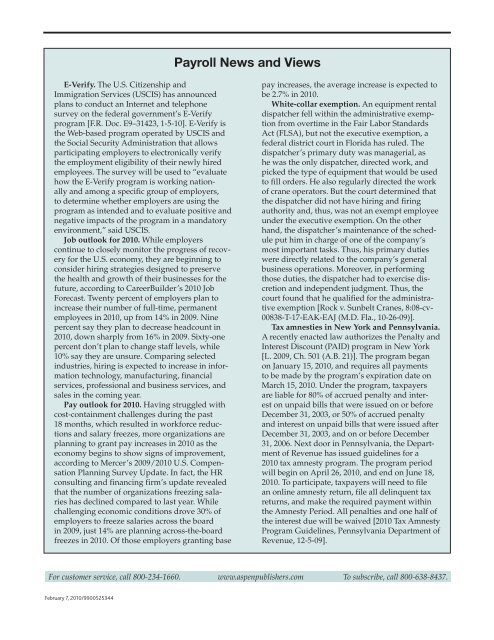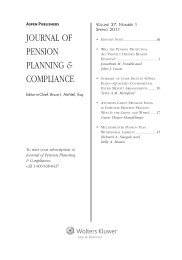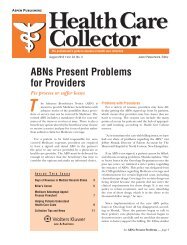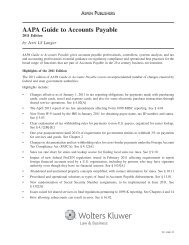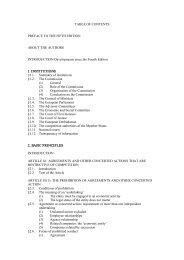Payroll Manager's - Kluwer Law International
Payroll Manager's - Kluwer Law International
Payroll Manager's - Kluwer Law International
Create successful ePaper yourself
Turn your PDF publications into a flip-book with our unique Google optimized e-Paper software.
<strong>Payroll</strong> News and Views<br />
E-Verify. The U.S. Citizenship and<br />
Immigration Services (USCIS) has announced<br />
plans to conduct an Internet and telephone<br />
survey on the federal government’s E-Verify<br />
program [F.R. Doc. E9–31423, 1-5-10]. E-Verify is<br />
the Web-based program operated by USCIS and<br />
the Social Security Administration that allows<br />
participating employers to electronically verify<br />
the employment eligibility of their newly hired<br />
employees. The survey will be used to “evaluate<br />
how the E-Verify program is working nationally<br />
and among a specific group of employers,<br />
to determine whether employers are using the<br />
program as intended and to evaluate positive and<br />
negative impacts of the program in a mandatory<br />
environment,” said USCIS.<br />
Job outlook for 2010. While employers<br />
continue to closely monitor the progress of recovery<br />
for the U.S. economy, they are beginning to<br />
consider hiring strategies designed to preserve<br />
the health and growth of their businesses for the<br />
future, according to CareerBuilder’s 2010 Job<br />
Forecast. Twenty percent of employers plan to<br />
increase their number of full-time, permanent<br />
employees in 2010, up from 14% in 2009. Nine<br />
percent say they plan to decrease headcount in<br />
2010, down sharply from 16% in 2009. Sixty-one<br />
percent don’t plan to change staff levels, while<br />
10% say they are unsure. Comparing selected<br />
industries, hiring is expected to increase in information<br />
technology, manufacturing, financial<br />
services, professional and business services, and<br />
sales in the coming year.<br />
Pay outlook for 2010. Having struggled with<br />
cost-containment challenges during the past<br />
18 months, which resulted in workforce reductions<br />
and salary freezes, more organizations are<br />
planning to grant pay increases in 2010 as the<br />
economy begins to show signs of improvement,<br />
according to Mercer’s 2009/2010 U.S. Compensation<br />
Planning Survey Update. In fact, the HR<br />
consulting and financing firm’s update revealed<br />
that the number of organizations freezing salaries<br />
has declined compared to last year. While<br />
challenging economic conditions drove 30% of<br />
employers to freeze salaries across the board<br />
in 2009, just 14% are planning across-the-board<br />
freezes in 2010. Of those employers granting base<br />
pay increases, the average increase is expected to<br />
be 2.7% in 2010.<br />
White-collar exemption. An equipment rental<br />
dispatcher fell within the administrative exemption<br />
from overtime in the Fair Labor Standards<br />
Act (FLSA), but not the executive exemption, a<br />
federal district court in Florida has ruled. The<br />
dispatcher’s primary duty was managerial, as<br />
he was the only dispatcher, directed work, and<br />
picked the type of equipment that would be used<br />
to fill orders. He also regularly directed the work<br />
of crane operators. But the court determined that<br />
the dispatcher did not have hiring and firing<br />
authority and, thus, was not an exempt employee<br />
under the executive exemption. On the other<br />
hand, the dispatcher’s maintenance of the schedule<br />
put him in charge of one of the company’s<br />
most important tasks. Thus, his primary duties<br />
were directly related to the company’s general<br />
business operations. Moreover, in performing<br />
those duties, the dispatcher had to exercise discretion<br />
and independent judgment. Thus, the<br />
court found that he qualified for the administrative<br />
exemption [Rock v. Sunbelt Cranes, 8:08-cv-<br />
00838-T-17-EAK-EAJ (M.D. Fla., 10-26-09)].<br />
Tax amnesties in New York and Pennsylvania.<br />
A recently enacted law authorizes the Penalty and<br />
Interest Discount (PAID) program in New York<br />
[L. 2009, Ch. 501 (A.B. 21)]. The program began<br />
on January 15, 2010, and requires all payments<br />
to be made by the program’s expiration date on<br />
March 15, 2010. Under the program, taxpayers<br />
are liable for 80% of accrued penalty and interest<br />
on unpaid bills that were issued on or before<br />
December 31, 2003, or 50% of accrued penalty<br />
and interest on unpaid bills that were issued after<br />
December 31, 2003, and on or before December<br />
31, 2006. Next door in Pennsylvania, the Department<br />
of Revenue has issued guidelines for a<br />
2010 tax amnesty program. The program period<br />
will begin on April 26, 2010, and end on June 18,<br />
2010. To participate, taxpayers will need to file<br />
an online amnesty return, file all delinquent tax<br />
returns, and make the required payment within<br />
the Amnesty Period. All penalties and one half of<br />
the interest due will be waived [2010 Tax Amnesty<br />
Program Guidelines, Pennsylvania Department of<br />
Revenue, 12-5-09].<br />
For customer service, call 800-234-1660. www.aspenpublishers.com To subscribe, call 800-638-8437.<br />
February 7, 2010/9900525344


